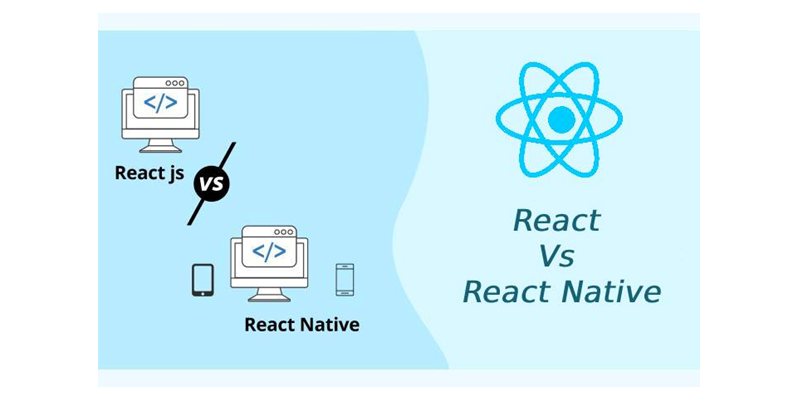
Reactjs and React Native are two almost identical front-end development technologies. This is the reason why it is difficult to choose React Vs. React Native. This blog is a comparison of React and React Native where we will compare both these technologies so that front-end developers can make an informed decision.
What Is Reactjs?
Reactjs is an open-source library that was developed by Facebook. It was designed to simplify the process of building interactive UIs with JavaScript. React has gained popularity among developers because it enables them to build user interfaces without worrying about how their code will be rendered on the client side. Because it allows developers to take advantage of the virtual DOM, which updates itself automatically as changes are made to the UI.
React uses the JSX syntax, which converts HTML-like markup into JavaScript functions that are easier to read and understand. It also offers tools for handling the DOM and state that are executed at certain points in time during an application’s life cycle.
Features Of Reactjs
It has a number of features that make it stand out from other web development libraries/frameworks, such as:
- It offers an easy way to create reusable components
- It is scalable by default, with the ability to render on the server or client side.
- It makes it easy to write performant code with a declarative approach.
- Reactjs uses a virtual DOM that updates very quickly with minimal overhead. It also caches DOM elements for efficiency and performs well on mobile devices.
- React components are rendered on the server, and the virtual DOM is updated in real-time to reflect changes made to the UI. This saves bandwidth and improves performance.
- React components use the same syntax across all platforms, including Browser and native mobile.
Advantages Of Reactjs
The advantages of Reactjs are as follows:
1) Performance – Reactjs renders on the fly, which makes it faster than other frameworks with similar features. It also uses virtual DOM, which makes it faster than other frameworks with DOM-based rendering methods like Angular and Vue.
2) Simplicity – Reactjs offers an easy way to build complex UIs without writing any boilerplate code or using any third-party libraries like jQuery, Bootstrap, etc.
3) Quality – Reactjs is a top-level framework for building dynamic UIs, which makes it easier to deliver high-quality applications in less time.
4) Community – The growing community of Reactjs helps in building large and complex applications.
5) Experimental features – Reactjs offers experimental features which are easier to implement than other frameworks with similar features.
6) Architecture – Reactjs is an architecture that supports the development of large and complex applications without compromising on performance or code quality.
Disadvantages Of Reactjs
Reactjs has some disadvantages too when it comes to performance. These include:
- The need to use JSX, which is an XML markup language that React compiles into JavaScript code
- The need for JSX syntax to be included in every single file and every single component (which can get quite complicated)
- The need to use an intermediary file
- More difficult debugging and performance optimization
What Is React Native?
React Native is a cross-platform mobile application framework that helps developers build native mobile apps with JavaScript. It’s an open-source project that was developed by Facebook.
It is a new way of developing apps for both iOS and Android with a single codebase. It has been designed to provide you with the best experience possible while also making sure that it doesn’t slow down your app.
The idea behind React Native is to make it easier for developers to build cross-platform apps without having to worry about differences in platform features and APIs. It has been embraced because of its ease of use, speed, and scalability.
React Native is used in a lot of different areas, from games to apps like Instagram that run on both iOS and Android.
Features Of React Native
React Native offers the following salient features:
- It provides a large number of readymade components that can be reused in an app.
- It uses the same language as JSX, which makes it easier to work with React Native codebase.
- It is possible to use the same codebase in iOS and Android
- It is easy to learn and use
- It uses fixed positioning, which doesn’t allow the app to be mobile responsive.
- The learning curve is steep because using Javascript
- Easier development process compared to other cross-platform frameworks due to its API
- Provides the ability to use native UI components in your app without writing any code
Advantages Of React Native
React Native provides a lot of advantages for developers and for end-users. Some of the advantages include:
1. Developers can build apps for both iOS and Android in one codebase
2. It is easier to develop apps because React Native uses JavaScript as its primary programming language, which makes it very easy to learn and use React Native’s API from any programming language or framework
3. Developers can reuse code across platforms since React Native is written in JavaScript
4. The app performance on different platforms is similar to each other because they share a similar codebase
5. Developers can test their app on different platforms without building a separate app for every platform
6. Developers can reuse code from other apps
7. React Native is open source, which means anyone can contribute to its development, and everyone has access to the same information on how React Native works
8. Development team members can share ideas more easily since they all share the same codebase
Disadvantages Of React Native
React Native has a few disadvantages, which are outlined below:
- There are no tools for debugging the code.
- React Native is not supported by many libraries and frameworks.
- The learning curve for React Native is steep and requires a lot of time and effort.
- It is difficult to find and hire qualified developers.
- It doesn’t integrate well with other frameworks or libraries.
- It takes time to develop an app.
- The learning curve is steep for both new and experienced developers.
- Requires a lot of development time and effort to create apps with advanced features.
- App performance may degrade over time.
Over To You
So this was all about React vs. React Native. We are hoping after reading this article, you will be in a much better position to make an informed decision for the development of your next project. But here’s a thumb rule, if you’re gonna develop a web app, then choose Reactjs, and if it is React Native, then go with React Native.
EnProwess is a global offshore development company who have successfully delivered 100+ projects. Our developers have experience working with startups, SMEs, and MNCs; in short, our developers are adaptable and obviously experienced in working with various technologies.
Our mission is to help budding entrepreneurs and small and medium-scale enterprises in enabling technology in business operations. For more information or quotations, visit our website.
For other tutorials, visit our PROGRAMMING section. You will be glad that you paid a visit there. Trust me. It’s worth visiting.
Author Bio:

Chirayu Joshi is the CEO of EnProwess – an emerging custom software development company that offers mobile app development, web app development, dedicated developers, and software testing service at a competitive price. His bold leadership and foresight have taken the company to great heights. He loves to read and share his insights on the tech industry.




